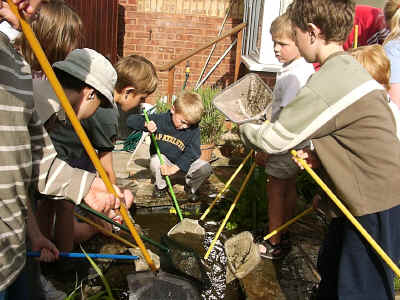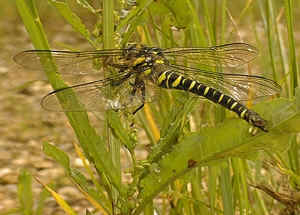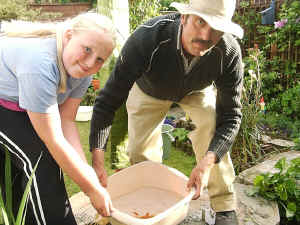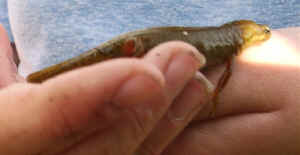The Young Rangers' Club
A Club for Children interested in Wildlife & Conservation
Polly's Pond Party
25th June 04

| Young Rangers to the Rescue!Friday, 25 th June saw the Young
Rangers congregate at a small garden pond in the heart of a Honiton housing estate. They
were there as part of their 'Wildlife in the Community' project. The project brings the
Young Rangers together with members of the local community in a working partnership to
improve conditions for local wildlife.
The Rangers' mission today was to clean the pond, evict the unwanted gold fish and return the pond to a condition suitable for aquatic and amphibious native wildlife. The number of ponds in Britain has declined dramatically since World War 2. This has happened as a result of extensive drainage of wet land for development, as well as because of lack of management of now unused ponds, which consequently silt up.
A small number of marginal plants (which like growing in marshy conditions) survived around the edges of Polly's pond. There were very few rooted plants growing in the water. These consisted of a small amount of Canadian Pondweed, which grows completely submerged in the water. Fish are not good for other garden pond wildlife. They will eat most of the other inhabitants of the pond. They also help to turn the pond into something resembling green pea soup, due to the excessive growth of small plants called algae. This happens because the nutrients in the pond are greatly increased by feeding the fish fish food, as well as by the fish excreting into the water. These nutrients then provide the algae with all they need to grow and mulitply.
The pond was cleaned out and refilled with rain water from a large water butt. The original inhabitants were returned to the pond, along with some fresh native aquatic plants. Polly's pond will rapidly recover from its cleaning out and without the fish in residence, will very soon be recolonised by all manner of new wildlife. Polly repaid the Young Rangers for all their efforts by providing a feast consisting of plates full of very tasty small cakes, 100 sausage rolls and plenty of squash, which was eagerly consumed by the Young Rangers. |
Find out how to make a garden pond good for wildlife here



